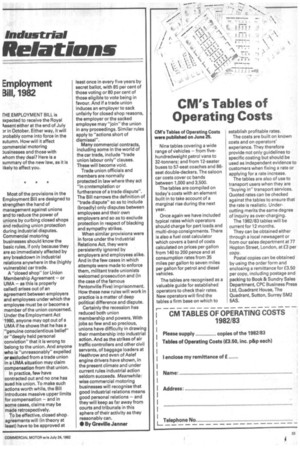Employment Bill, 1982
Page 31

If you've noticed an error in this article please click here to report it so we can fix it.
1HE EMPLOYMENT BILL is .1xpected to receive the Royal ekssent either at the end of July )r in October. Either way, it will )robably come into force in the 3utumn. How will it affect omrnercial motoring Jusinesses and those with Nhom they deal? Here is a 3ummary of the new law, as it is ikely to affect you.
Most of the provisions in the Employment Bill are designed to strengthen the hand of management against unions and to reduce the power of unions by curbing closed shops and reducing union protection during industrial disputes. Commercial motoring businesses should know the basic rules, if only because they are so immediately affected by any breakdown in industrial relations anywhere in the (highly vulnerable) car trade.
A "closed shop" (or Union Membership Agreement — or UMA — as this is properly called) arises out of an agreement between employers and employees under which the employee must be or become a member of the union concerned. Under the Employment Act 1980, anyone may opt out of a UMA if he shows that he has a "genuine conscientious belief" or "deeply held personal conviction" that it is wrong to belong to the union. And anyone who is "unreasonably" expelled or excluded from a trade union in a UMA situation may claim compensation from that union.
In practice, few have contracted out and no one has sued his union. To make such actions worth while, the Bill introduces massive upper limits for compensation — and in some cases, claims may be made retrospectively.
To be effective, closed shop agreements will (in theory at least) have to be approved at least once in every five years by secret ballot, with 85 per cent of those voting or 80 per cent of those eligible to vote being in favour. And if a trade union induces an employer to sack unfairly for closed shop reasons, the employer or the sacked employee may "join" the union in any proceedings. Similar rules apply to "actions short of dismissal".
Many commercial contracts, including some in the world of the car trade, include "trade union labour only" clauses. These will become void.
Trade union officials and members are normally protected in law where they act "in contemplation or furtherance of a trade dispute". The Bill narrows the definition of "trade dispute" so as to include (broadly) only disputes between employees and their own employers and so as to exclude protection in respect of blacking and sympathy strikes.
When similar provisions were in force under the Industrial Relations Act, they were persistently ignored by employers and employees alike. And in the few cases in which attempts were made to enforce them, militant trade unionists welcomed prosecution and (in the case of the famous Pentonville Five) imprisonment. How these new rules will work in practice is a matter of deep political difference and dispute.
Certainly the recession has reduced both union membership and powers. With jobs so few and so precious, unions have difficulty in drawing their membership into industrial action. And as the strikes of air traffic controllers and other civil servants, of baggage loaders at Heathrow and even of Aslef engine drivers have shown, in the present climate and under current rules industrial action seldom succeeds. Meanwhile: wise commercial motoring businesses will recognise that good industrial relations means good personal relations — and they will keep as far away from courts and tribunals in this sphere of their activity as they reasonably can.
• By Greville Janner










































